Etta Mae powered through the hardships, caring for her nine children with little money and sometimes not enough food, and relying on her deep faith. She prayed for Jim, especially when he drank; she prayed for provision and safety for her family, and she prayed for the strength she needed to hold the family together. After the flood and relocation to White’s Ferry Rd., tragedy struck, and Etta Mae had her greatest test of strength and faith. Jim had continued to fish, trap, hunt and sell whiskey all through the Prohibition years, and his drinking had also continued. In his words, “I had become my own best customer!”.

Large families like Jim and Etta Mae’s were common in the 1930s
On a hot July day in 1932, he had been out all night drinking and Etta Mae went looking for him. She had packed him a bag and left it on the steps in case he came home before her, planning on asking him to leave unless he quit drinking. With nine children ranging in age from 15 years to 8 months old, the older ones were often left in charge of the babies while Jim and Etta Mae were away. Such was the case on this day when O.D., Oliver, Derwood, and John A. were swimming in D’Arbonne Bayou to cool off. Gustal, known as “Boots”, who was two years old had followed them and was sitting in the boat while the older boys swam. They called him “Boots” because he was always climbing in and out of the big boy’s boots left by the door. Nita and Carrie were likely in the house watching Jimmie who was 5 years old and George (Tut) , who was 8 months old.
Boots fell out of the boat without the boys noticing, and he drowned in the muddy water despite all their panicked efforts to save him. When Jim and Etta Mae returned together, they were greeted by a sorrowful sight. The older boys had retrieved Boots from D’Arbonne Bayou, and unable to revive him, had laid his small body on the bed, waiting for the terrible news to be tearfully told.
The sorrow, like the humid July heat, pressed on the hearts of the whole family that night, and for nights and months to come. The older children were heartbroken with the loss of their baby brother and the guilt of having let it happen on their watch, but it sat heaviest on Etta Mae’s heart, a mother’s heart, not equipped for the full force of losing a child to sudden death.
She washed and dressed his body, and greeted friends and family who came by that night to pay their respects. The next day. she endured the funeral at McCormick Cemetery near Drew in a daze, standing motionless as they lowered the painfully small casket into the grave. After the funeral she washed and folded Boots’ clothes and packed them with a lock of his hair in a small trunk that had been hers as a child. She kept it in her room near her for many years.

McCormick Cemetery in Drew Community , West Monroe 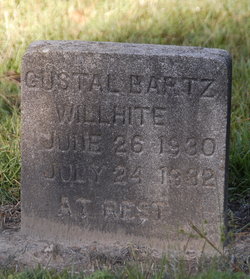
Bartz’ headstone
BIRTH
26 Jun 1930
DEATH
24 Jul 1932 (aged 2)
BURIAL
McCormick Cemetery
Ouachita Parish, Louisiana, USA
Giving over the household chores to Nita,Carrie, and the boys, she sat on the porch for hours each day, staring into the muddy water of D’Arbonne Bayou, willing that time would turn back. Her pain was intensified by the circumstances of how and why she had not been there, and it cut like a knife between her and Jim. He was broken, and begged her to forgive him, swearing that he would never drink again, a promise he kept.
Calling on her faith and the power of prayer more so than ever before, she found it in her heart to forgive him and move on. By the fall of 1933, Etta Mae had given birth to another son, Charlie Seth, and Jim had made a decision that would profoundly affect them all. He had decided to move the family to Flowers Landing in Tensas Parish. He had been going there whenever he could since 1925, as mentioned in Jimmy’s book, My Family and the Tensas, hunting and trapping to supplement his income.
On his first trip to Tensas, according to memories of my brother Kenneth and stories daddy told him, Jim didn’t let distance stand in his way. He bought a heavy-duty bicycle with a basket, invested in steel traps and camping equipment, loaded everything on a rail car headed east to Tallulah, then south, with a stop at Somerset Plantation, a cold seventy-mile ride. Off the train, he likely bought some supplies at Somerset store, then peddled the five miles toward the river, tough going once off the plantation, but it brought him to the edge of a hunter’s paradise. Before him lay the wild, a dense stretch of hardwoods covering more than one hundred thousand acres. Owned by the Singer Manufacturing Co., Chicago Mill Lumber Co., and others, the refuge teemed with game and was floored with a thick growth of palmetto. Crossing at the new railroad bridge at Flowers Landing, he found a place to camp, then trapped along the river for more than twenty miles, staying until he had all the hides and meat he could manage to haul out.

1920s rail car 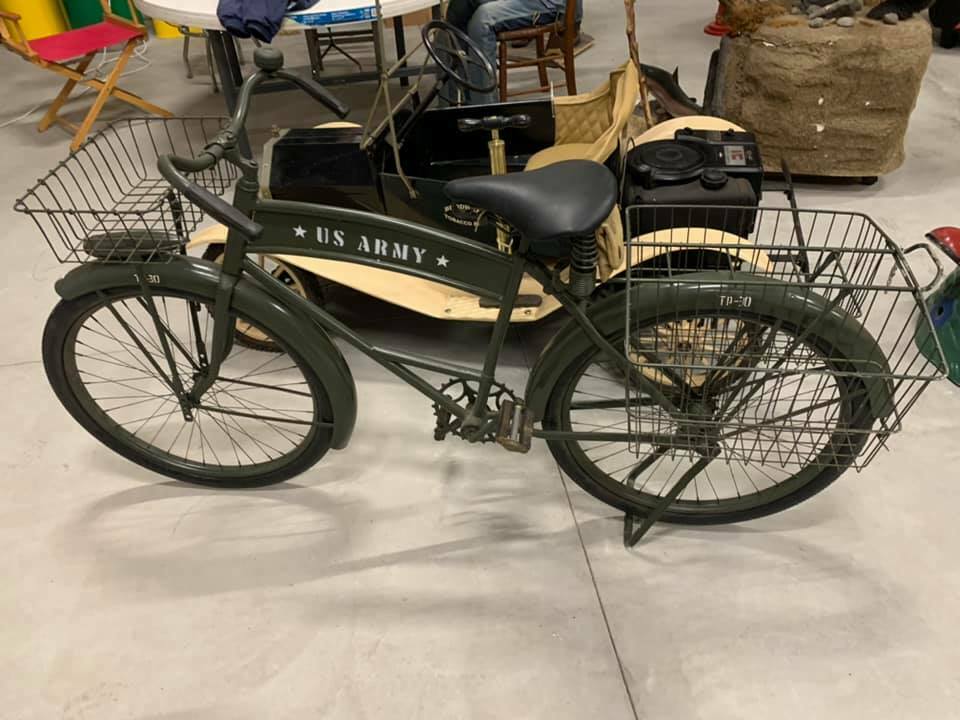
Jim’s bike was similar to this army bike 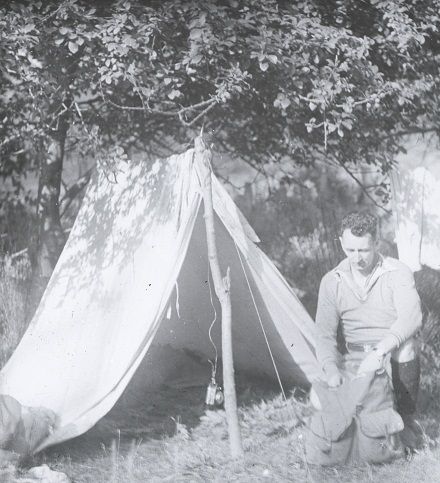
a simple tent like Jim used 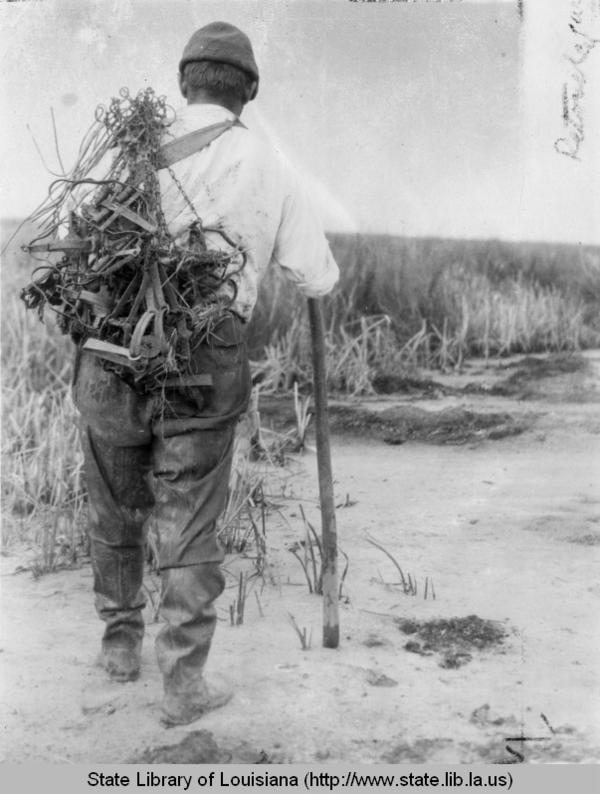
Louisiana trapper in the 1930s 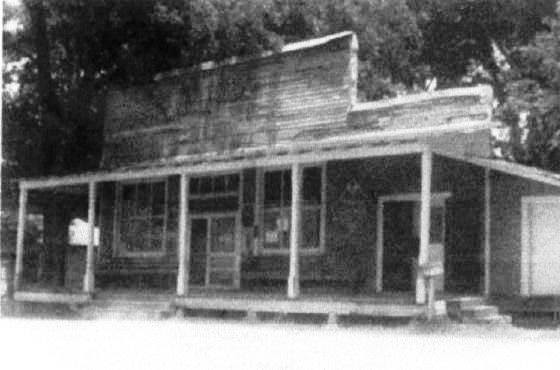
Somerset Plantation Store which was near the depot
Jim continued to trap and hunt the refuge for the next eight years, going back and forth on the train and later in a truck with his boat and Myron Hart, Etta Mae’s brother. His skills as a woodsman helped him learn every inch of the thick woods, where every break or lake was located, and every bend of the river so well that he could navigate his boat at night without a light.
When he was away, every member of the family was expected to help keep things running smoothly at home. Under Etta Mae’s supervision. Nita and Carrie, were responsible for helping run the house and care for the younger children. He had taught his older boys, O.D., Oliver, Derwood, and John A. to work at the sawmill, help run the nets, and kill and process game by the age of five or six. By the time they were ten or twelve, Jim took them on hunts with him on the Tensas River, teaching them how to survive and thrive in the Big Woods. He reportedly left O.D., and sometimes Oliver, camping out in the Tensas woods for weeks at a time to kill game and run the traps, while he went back and forth to West Monroe.
He became familiar with the woods along the Tensas River as he hunted and trapped there, and also became acquainted with the family that had a place near the landing. When the husband died, the widow offered to sell it to Jim at a bargain price, so she could move to New Orleans near her family. Jim jumped at the chance, sold his interest in the Howard Griffin machine shop and used the money to buy her forty acres with a house, sheds, and outbuildings, for two hundred fifty dollars. In a time when countless people across the country had lost all hope, Jim had found his at Flower’s Landing. When he told Etta Mae about it, she was unsure at first, but knew they needed a change. The Depression was affecting their businesses and money was getting more and more hard to come by. Still saddened by the death of Boots, she was also dealing with the rebellious behavior of Nita.
The way they lived offered little entertainment for a beautiful young woman like Nita. Her days were filled with the hard work of cooking, cleaning, washing, ironing, changing diapers and caring for small children, all without the help of any modern conveniences. She had attended school on and off up to the seventh grade, but she dropped out altogether to help her parents, as her younger brothers had done. At least the boys enjoyed adventures when they were out hunting and trapping with Jim, but there was little adventure in working at home the way she did. It’s no wonder she looked for the company of an interesting person who made her feel pretty, took her dancing, and gave her his undivided attention. He was a welcome escape from the drudgery at home, but she may not have been a good judge of character, considering her lack of experience. Evidently, she wasn’t, and when there was an unwanted pregnancy, Jim forced her to abort it. According to Jan and what she heard from other family members, it was reportedly a botched procedure and she never had other children, and worse, it caused her to have long lasting emotional problems resulting in more than one nervous breakdown. Later in life Nita told my mother, Mary, that her parents had made her break it off with “the love of her life” and that she would never get over it. Emma Lou, one of the younger siblings was once asked why her parents had moved to Tensas in the middle of nowhere and she replied, “To get away from the evil influences of town.” She was referring to Jim’s drinking and the incident with Nita.
“The Lord is close to the brokenhearted and saves those who are crushed in spirit”
psalm 34:18
This chapter made me cry. I loved Aunt Nita so much. Not surprising she asked me to name my daughter after her. She was always so proud that I followed through with her request. Really enjoying this Rosemary!